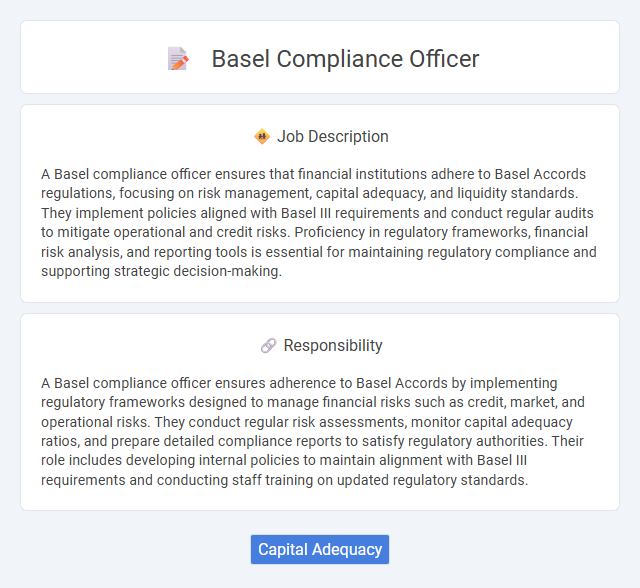
A Basel compliance officer ensures that financial institutions adhere to Basel Accords regulations, focusing on risk management, capital adequacy, and liquidity standards. They implement policies aligned with Basel III requirements and conduct regular audits to mitigate operational and credit risks. Proficiency in regulatory frameworks, financial risk analysis, and reporting tools is essential for maintaining regulatory compliance and supporting strategic decision-making.
Individuals with strong analytical skills, attention to detail, and a thorough understanding of Basel regulations are likely to be suitable for a Basel compliance officer role. Those who can handle regulatory pressure and adapt to evolving compliance requirements may find the job aligns well with their competencies. Candidates lacking interest in regulatory frameworks or struggling with high-stress environments might face challenges in fulfilling the responsibilities effectively.
Qualification
A Basel compliance officer typically requires a strong background in finance, risk management, or regulatory law, often supported by a bachelor's or master's degree in finance, economics, or a related field. Professional certifications such as Certified Regulatory Compliance Manager (CRCM), Certified Anti-Money Laundering Specialist (CAMS), or Financial Risk Manager (FRM) are highly valued. Expertise in Basel III regulations, risk assessment methodologies, and financial reporting standards is essential for ensuring adherence to international banking compliance requirements.
Responsibility
A Basel compliance officer ensures adherence to Basel Accords by implementing regulatory frameworks designed to manage financial risks such as credit, market, and operational risks. They conduct regular risk assessments, monitor capital adequacy ratios, and prepare detailed compliance reports to satisfy regulatory authorities. Their role includes developing internal policies to maintain alignment with Basel III requirements and conducting staff training on updated regulatory standards.
Benefit
Basel compliance officer roles likely offer benefits such as enhanced career stability due to the increasing regulatory emphasis on Basel standards across financial institutions. Professionals in this position probably gain opportunities for skill development in risk management and regulatory frameworks, which can lead to higher earning potential. The role may also provide a chance to influence organizational governance and contribute to maintaining financial system integrity.
Challenge
A Basel compliance officer likely encounters significant challenges in interpreting complex regulatory requirements and ensuring their accurate implementation across financial institutions. The role probably demands constant vigilance to adapt policies amid evolving Basel frameworks, which can be ambiguous or subject to frequent updates. Managing stakeholder expectations while minimizing compliance risks may also present ongoing difficulties.
Career Advancement
A Basel compliance officer plays a crucial role in ensuring financial institutions adhere to Basel regulatory frameworks, including Basel III standards on capital adequacy, stress testing, and market liquidity risk. Career advancement opportunities often involve progressing to senior compliance management roles, such as Chief Compliance Officer or Risk Manager, supported by specialized certifications like Certified Regulatory Compliance Manager (CRCM) or Basel-specific training. Mastery of Basel regulations combined with expertise in risk assessment and regulatory reporting enhances prospects for leadership positions within banks and financial regulatory bodies.
Key Terms
Capital Adequacy
A Basel Compliance Officer ensures adherence to Basel III regulatory frameworks, focusing on maintaining optimal Capital Adequacy Ratios to safeguard financial stability. They assess risk-weighted assets and capital buffers, aligning bank capital levels with regulatory requirements set by Basel Committee on Banking Supervision. Proactive monitoring and reporting of capital adequacy enable institutions to mitigate risks of insolvency and comply with international banking standards.
 kuljobs.com
kuljobs.com